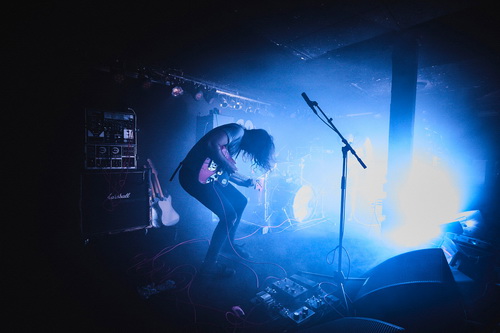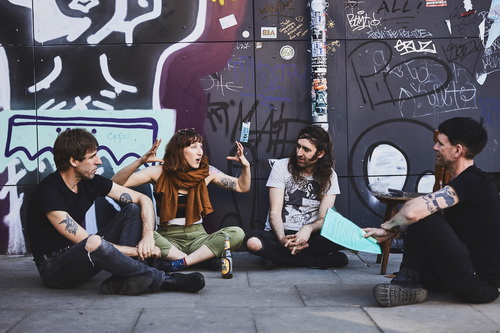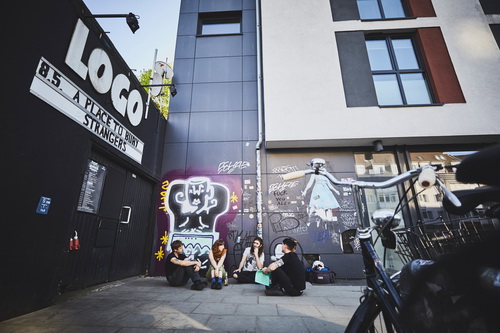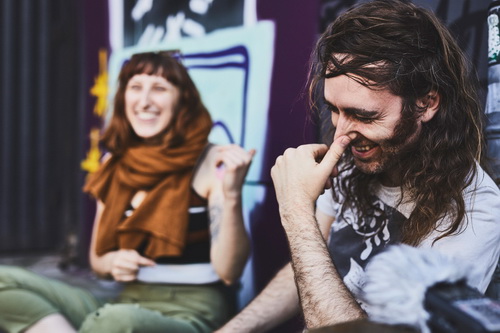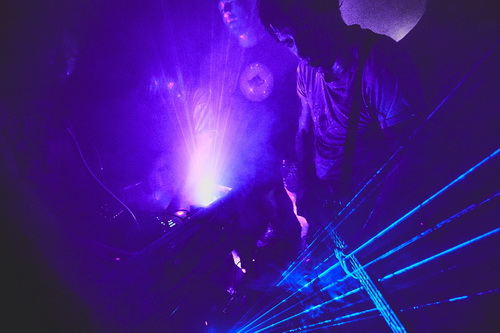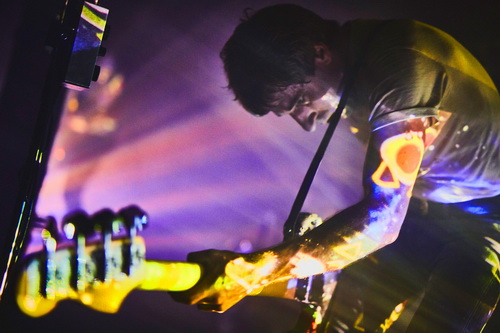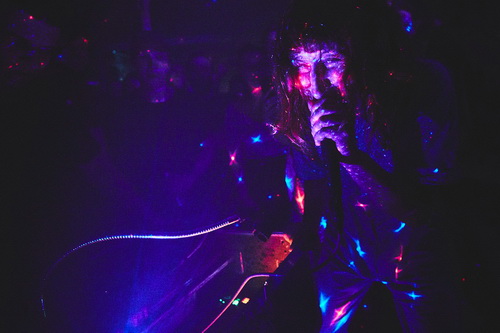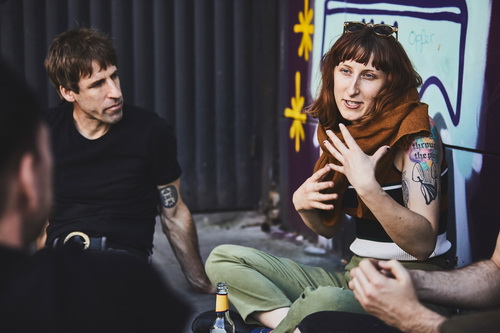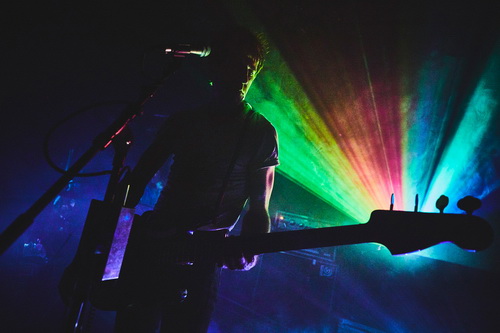
The louder side of the Wall of Sound – A Place to Bury Strangers interviewed
Posted In Interviews,Slider by Jimi Nilsson
What makes a show something you remember for years? Does loud noise cause severe hearing loss? Are you one of those thinking that The Jesus and Mary Chain landmark “Psychocandy” is the epitome of dirty, gritty and loud music? It’s obvious that you haven’t listened even to A Place to Bury Strangers. If you expect to get home from a standard gig experience with a typical decibel level just under 100dB you apparently haven’t been to a show by these noise heroes - there will be broken gear and walls of sound louder than anything you’ve ever heard.
Being hailed as the loudest band in New York with their feedback-drenched, experimental noise rock and shoegaze sound and the aggressive high energy live shows, A Place to Bury Strangers found their way to Hamburg and LOGO to do another “Pinned” tour show. Dion, Oliver and new drummer Lia met up with Release in Hamburg, taking the interview out in the shadow on the street for a chat about about their passion for the DIY approach, endless repairs of gear and their recipe for bold intensity and aggressive aesthetic. Don’t miss our interview and live pictures.
Transitional times
Since their first self-titled album in 2007 until their recently released fifth album “Pinned”, A Place to Bury Strangers have gone through several transitions both in terms of sound and band members. The harmonies have moved from drum machine backed up shoegaze and indie rock on “Exploding Head” to fuzz and distortion pedal use beyond what you can afford to buy, ending up in walls of feedback-drenched noise rock on mind-blowing albums as “Worship” and “Transfixiation”.
From the original setting there’s only Oliver Ackermann left but with New Zealand-born bassist Dion Lunadon, being part of APTBS since 2010, and the latest addition of Lia Braswell on drums and backup vocals, with experience from punk act Le Butcherettes, the band has never had a better setup of musicians. On album after album, the band has reinstated the same structural logics; simple post-punk basslines, driving industrial punk drums, and squalls of really loud noise. However, “Pinned” is their most stripped-down album to this day. The question is if APTBS is about to slow things down a bit.
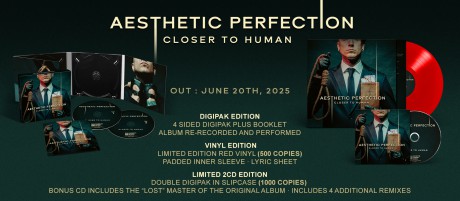
The new album “Pinned” is much more stripped-down, let’s say a bit quieter, compared to “Transfixiation” and “Worship”, two albums that labeled you the “loudest band in New York”. “Pinned” is quite a change compared to your previous albums. Are you going in a new direction where you strip away some of the noise rock parts?
Oliver: Things are always in a new direction. Often the goal is to make the craziest fucking album of all time, that’s what we originally strive for which we probably try to do with the next record (laugh). But this record was more of recorded songs in this transition of time of these different things going on in life.
There were a lot of changes going on; we played with a lot of different people at the time, Lia joined up and got integrated into the band, and we just tried to figure out what A Place to Bury Strangers really is, so this record is just documenting that natural process. But now, when Lia has joined the band, it has taken the band to something completely different, and it leaves it wide open for whatever the future may hold.
Considering this transition, how would you describe the evolution of APTBS over five albums? How would you say that you have evolved from the first self-titled album to “Pinned”?
Lia: That’s what they call me (laugh)!
Oliver: There is definitely a lot better players than we were playing with at the time. Back then it was kind of me controlling everything – a lot of different things. The first record is pretty much my demos I was recording and then, as the band has been going on, we have just become more focused on the live show and we have developed that part a lot, and that has turned into where it is to this day.
About the progression, it’s kind of really hard to say what has actually happened. Life just changed so much during the years, and the first album came out in 2007 with songs even recorded in 2004 and 2005, so we’re in a quite different place in our lives now than we were back then. We’re a bit older (laugh), you know we used to get into crazy, stupid shit all the time but now we only do it at times (laugh).
Your music is built on many layers of guitars and heavy use of effect pedals. How do your create this sound? Do you work with it stripped off pedals from the beginning or is it a “yeah, this sounds dirty and gritty, let’s build something around it” process?
Oliver: One of the things with APTBS is that we constantly try to change this process. There’s even a song on this record where we kind of made the laziest choices we possibly could, what the parts were and what sort of was going on. And that kind of gives it a little bit of a cool popped up attitude. And there are other songs that have many, many layers of things on them – lots of different instruments, just a different approach than before.
We really don’t have any method to how we create the music, it’s more about searching and finding out what is really interesting to listen to, and of course what we like and can make something out of on stage.
Lia: We still looking for that, the concrete vision that we all have. Oliver said before that he faces his songwriting with the sounds he makes, you know finding the right sounds and making the song from that. I really like when we write songs on our four-track because it has a very simple foundation and from that we sort of build and create things around it. What’s your approach?
Dion: I just get my guitar and see what comes out.
It’s quite clear that you use lots of overdubs on record, actually on a massive scale, to get that really dirty sound that is your brand. But how do you recreate that wall of sound on stage?
Oliver: It’s a lot easier to be honest. At your house you can’t really crank up your stereo all the way, it enforces you to sit right in front of the speakers but when you come to our show I can. Basically we’re kind of being able to control the different sounds live.
We’ve been doing a lot of different things like fuck up the sound system as well as the environment that we’re in so we can change things and manipulate stuff that’s happening that we usually don’t have enough room in the sonic spectrum to do off stage.
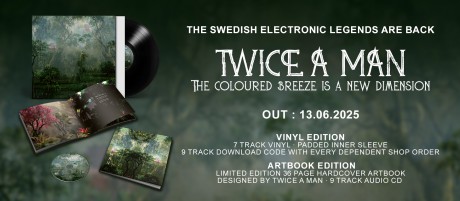
The passion for the DIY community
One striking feature of APTBS and their frontman Oliver Ackermann has been the strong connection and loyalty to the DIY scene. For many years Ackermann resided in one of New York’s, probably, most famous DIY performance spaces, Death by Audio, and ran a homegrown guitar-pedal company also sporting the Death by Audio name.
And this association between Ackermann and Death by Audio have constructed a bond between APTBS and the DIY industry in the sense that APTBS represent the epitome of DIY music. However while the Death by Audio performance space has been forced to close down to make way for new office spaces in Williamsburg, APTBS still continue on their DIY path.
To me APTBS is a role model for DIY music, but is DIY really DIY anymore?
Oliver: For me, the DIY industry aesthetic always going to be the most exciting, I’ve always liked the counterculture and what people are doing in that. The really exciting stuff is when someone will play on the street in fear of getting arrested or has a venue where you really can feel the love in your heart and soul and how they care in detail about what the heck is happening. It doesn’t have to be paint on the wall or anything like that, you just get this sort of sense of realness in the people that you’re working with and hanging out with. So, when you play those places where people really appreciate and care of what’s going on and where it actually means something to their lives to have a particular show, those are that kind of shows I want to be part of.
I think that’s the strongest with the DIY community because these people have to risk things and really put themselves out there, to go beyond working for money to make this stuff happen. In the end you get something really pure. Sometimes bands get big or there get to be too much money in everything and you can just tell that it sucks life out of people, but I don’t want say it’s only bad. I still love lots of things that’s popular and all that crap but I’m really more excited and thrilled about when you got some kid who’s just really fucking excited to be playing and going for it all the way – that’s the best shit.
But hasn’t DIY changed quite much compared to its origin in the 1970:s punk scene where you actually did everything on your own? I mean, most bands I’ve talked to work with teams helping them out although in quite a different configuration than under the record label era.
Oliver: Yes, that’s what happened but there’s a whole range of all of that too. It’s even a lot of these people who are DIY and then they also have people who are supporting them. Even a band like ours, we have worked it out to make enough money to make things possible, to sustain and can afford to come to Europe and stuff like that. For other people it’s like an insane struggle to make things happen and I feel like many of those bands that struggle every day – that is what makes the DIY community pure.
Insane live shows: “We can play a show with just a cable into a PA”
You may think you’ve seen it all on stage but a live show with A Place to Bury Strangers is beyond the limit of saneness, best described as “you are going to get a chance to connect with something very primal, liberating and sometimes even violent” (TimeOut Hong Kong, 2017). In addition to the walls of sound, there’s a fair amount of flailing and some acts of violence against musical instruments to be expected.
If you are a gear freak caring for your musical equipment like they were your children, APTBS would cause severe emotional stress since Ackermann and Lunadon treat their gear as their worst enemies. Guitars are tossed across the stage or up in the air but most of it is part of the imagery – the APBTS live brand – they have built through their live shows over the years.
Your shows are known to be “chaotic”, sometimes described as violent, and in a way you are the epitome of the rock’n’roll myth throwing guitars around you. I even remember a show in Gothenburg three years ago when you dragged everything off stage and played the last songs on the floor. Is there any philosophy behind your, let’s say, aggressive live shows?
Oliver: We just try to go so far out of our heads that you’re not really aware of what’s going on.
Dion: There is a lot of spontaneity but also a lot of planned stuff, obviously when we drag things out on the floor. But it changes from night to night, we talk a lot about “let’s try this, let’s try that”, just a couple of ideas to turn the show on its head but something often goes wrong and then you need to find your way out of it.

Oliver: There is often a change in the direction where the setlist is going, making up songs on the spot or someone has broken their equipment in some sort of way so it got to morph into something completely different than we planned to do. We’ve done things like “Yeah, let’s drag our amps off stage” and then you can’t yank it out from the wall or something like that.
A good example of that is when we played this show and it was going to take a turn where there was going to be a surprise when we were going into another room and continue the show, but when we got to the door it was locked so we had to take this amplifier and smash it through the door to get through to the other side, to have the second part of the show (laugh). That was way better than opening the door the ordinary way.
Considering the loudness you create on stage, have you ever had problems hearing the monitors because it’s too loud?
Dion: We don’t really play with monitors, I mean you just walk up to your amp and turn it down a little bit (laugh), a lot of people don’t do that because they’re afraid of changing things on stage.
Oliver: We have our hands all over the controls the whole time, and wherever we go, the place we play, we all play out of any amp. You know, our guitars barely work anyway. I think that the band is of a particular aesthetic, making those kind of sounds and sharing a vision. We’re used to a lot of shitty equipment, late night shows where equipment don’t show up and have played a lot of weird environments – we just embrace that kind of situations (laugh).
You probably don’t use the best of stuff on stage? You must go for “not easy to break” gear rather than high quality guitars, pieces that don’t require much repairs?
Lia: There’s a lot of repairing, really a lot of repairing (laugh).
Oliver: We even try to fortify the equipment to make it better than it was from the factory, change a lot of things and add stuff so things don’t break that easily. A lot of stuff come with some really cheap parts in them and we replace a lot of that stuff out just to make the equipment better. At least in this day and age people need to cut a lot of corners to make things affordable rather than using that stuff made in the fifties or other high quality gear.
And you never had to cancel a show because the gear is beyond repair?
Oliver: Not really. The only thing that ever happened is that the power totally shuts out and then it’s not a thrilling show but we can play a show with just a cable into a PA. We had one of those shows at SXSW (laugh). All we need is a wire, you need one piece of wire going into an amplifier and then you’re fine (laugh). At SXSW we did fourteen shows in three or four days and only once the power went out, it was during a song actually.
How is it for you Lia to be a drummer with these guys? You have another background than they have coming from the punk scene.
Lia: We definitely have different backgrounds and all kinds of different approaches to music which I think is really exciting. At the core of it we all have an energy that we like to present music to an audience, just doing something you wouldn’t anticipate just by meeting us. I have been playing since I was eight and this is kind of different.
Oliver: She just turned fourteen so six years of drumming (laugh).
Lia: My mom signed me on and told me I can skip school (laugh).
I think I’ve just always had this loud approach to playing that I always thrust myself into using whatever technique I have from playing so long and then making it something where it’s almost like I never played in my entire whole life, like it’s my first time doing it. And it’s just as exciting every time. With these guys it’s something I never had going on in my last band because it felt like we were trying to embrace the performative kind of thing in our music. But with these guys, it’s just really sonically engaging more than anything so I feel like I’m being pushed in this other way but also experiencing the show as it goes, like I’m experiencing it as much as the audiences.
The other day we were going through the crowd to play our set with everybody and I was trying to push through the crowd and they were all like peering through trying to see what was going on in the center of the room, and there was this one girl which sort of blocked the area for me to go through and I went to her and said “That’s my band” without even thinking and she said “This is everybody’s band” and I was like “Fuck yeah, I like you” (laugh).
Have you ever got some of their guitars in your head?
Lia: No, just some piece of a guitar that hit me in the head the other day. Fortunately it wasn’t a sharp part. But I had a sharp piece of my stick flying into my eye but I kept playing. I hit myself all the time but they haven’t hit me yet fortunately. Maybe tonight (laugh).
How often has it happened that you hurt each other or yourselves during live shows? How controlled is your guitar throwing? Because it looks kind of violent from the floor.
Dion: When I do it it’s not very controlled, not at all. I’ve hurt myself more than anyone in the band.
Oliver: Sometimes you hurt someone a little bit but it’s not like we’re going to through something out on anybody, there’s no malicious thing to hurt people who come to the show. But yeah we’ve hurt each other sometimes but also trust each other.
You haven’t ever thought “Ey, I’m getting too old to do this shit on stage and need to calm down”?
Dion: I feel the opposite (Lia laughs). I think it’s lame when people get older and get like “Oh, I think I’m going to calm down”, it’s just boring to hear. I live much healthier now than when I was younger so I’m much stronger (laugh).
Oliver: We hurt ourselves during shows and I got myself whiplashed but I saw this documentary about a native American guy and he was 87 years old or something like that and he was doing his flips and stuff, and he said that the key to stay limber was to constantly be active so hopefully if we can keep on playing shows and never stop (laugh). We just build it up and won’t be broken down.
So tonight, can we expect anything else than a completely crazy show?
Dion: Some slobbing around with a total lack of energy, like a piece of dead flesh on the floor (laugh).
Photos for Release by: Julia Schwendner


